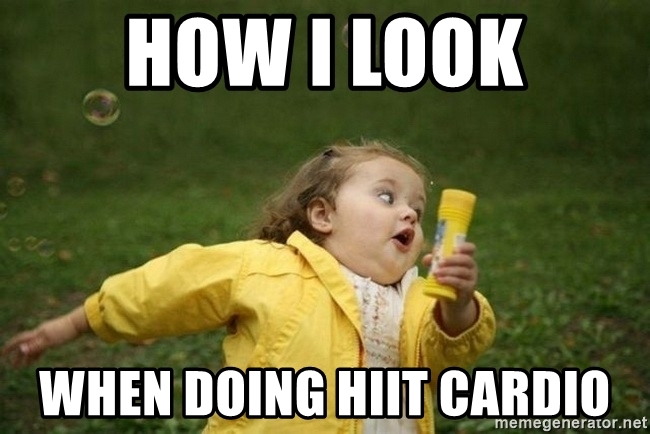I honestly don’t know myself. Mainstream media and avid fitness alike all seem to be gushing how great HIIT is and how great of an exercise it is to lose weight. That last part raised a few eyebrows of mine.
“One of the best exercises to do to lose weight”
The typical mainstream media headline that has everyone glued to their screen. I have to admit, that is some great copywriting skills right there. I can’t even hate on that. Nevertheless, I took it upon myself to find the actual truth.
Is HIIT as effective as everyone says it is?
Is HIIT one of the best exercises to do to lose weight?
Is HIIT even necessary?
Care to see what I discovered along the way?
Dive in.
What is HIIT?
It would be a disservice to you if I jumped straight into this article assuming that you already knew what HIIT was and you probably already do, but it’s not a chance I am willing to take.
High Intensity Interval Training (HIIT) is a form of cardio that alternates periods of intensity with brief recovery periods to the point of exhaustion. The common phrase is “to get your heart rate up, get you sweaty and burn a lot of calories in a short period of time.” Essentially to get the “most” out of your workout, but is it as effective as everyone says it is?
The answer is yes:
You can burn more calories in a short period of time
It’s great for cardiovascular health
It can improve aerobic and anaerobic performance
But it is not a requirement to lose weight, nor is it a must do activity. If you don’t enjoy doing HIIT but rather walk instead, then do that. A study done here concluded “opting for HIIT as an alternative to standard exercise recommendation led to no difference in health outcomes after 12 months.

Like mainstream media does best, tagging a headline that is sure to generate a visceral response from you, me and others alike, regardless of whether it’s true or not.
Is HIIT One of The Best Exercises to Do to Lose Weight?
With information consistently being shoved down your throat, it’s easy to be a headline reader and accept the status quo, without doing much due-diligence. That’s where I come in. My job is to serve you in the most truthful, transparent and concise way I can.
There is no best exercise to lose weight. Nutrition is the pillar for weight loss. There is an ungodly amount of research detailing the direct relation between weight loss and adhering to a proper nutrition (eating less calories overtime). Choosing an exercise you enjoy, something that is sustainable and that you can adhere to long-term is imperative for fitness success whether that is losing weight, gaining muscle or both.
It can be difficult to know what to do or even know where to start when:
- You’re new to fitness
- There is so much noise and information thrown at you from all directions
Enticing headlines like:
Do this to lose weight in ______ # of weeks
The best exercise to lose weight is ________
It’s no surprise why you find yourself flocking from one program to another in the hopes of finding the “answer”. Let me save you the trouble, there is no quick fix, no best exercise, nothing, but consistency, patience, a basic strength and nutrition program to follow. That’s it. Don’t let social or mainstream media and headlines fool you. It’s as simple as it sounds.
Is HIIT Necessary?
I am sure you’ve asked yourself that same question at some point. The way it’s advertised and talked about at nauseum almost makes you feel like you’re missing out or doing something wrong with your own program.
The answer is no, more of a preference if anything. Let’s be frank, you really just want to know if it’s something you have to include to your already busy schedule. It may not make sense for you. You may be new to training, overweight, obese or whatever else and doing this style of training can impede your progress altogether.
This study concluded “prescribing a higher intensity exercise decreases adherence and results in the completion of less exercise, thus a successful exercise program should be proposed at a moderate intensity and a low perceived effort because obese subjects who have low self-efficacy, poor mood status, and are not familiar with high intensity workouts could easily drop-out.”
Conclusion
If you’re someone who likes the feeling of getting the “most” out of there workouts for some psychological feel-good mentality, then HIIT maybe for you and for those of you who enjoy walking, running, biking or whatever else then do that instead. It’s all predicated on personal preference, lifestyle, time and enjoyment. Hopefully this article did a good job answering some of your questions.
